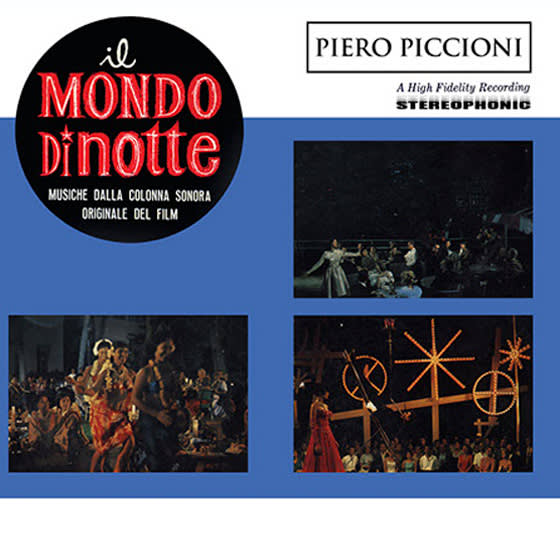While Piero Piccioni penned more than 300 soundtracks in his lifetime, the Italian Maestro effectively kicked off his prolific career in cinema with Il Mondo di Notte. Released in 1959, the album served as the soundtrack to the very first "Mondo" film, as well as Piccioni's first major scoring project. But despite the "where it all began" status, the music of Il Mondo di Notte has largely been lost over the decades, with the album only ever arriving via some extremely early — and now rare — mono vinyl pressings on RCA. Better late than never, though, a much-deserved reissue of Piccioni's masterful Il Mondo di Notte has at last surfaced.
Via Camille 3000 — the label launched by the late composer's son Jason Piccioni — Il Mondo di Notte has been dusted off, remastered and expanded for a lovingly assembled re-release. For the first time, the music has been presented in full stereo, as well as on CD, with an additional ten bonus tracks thrown in for good measure.
Translated as "The World at Night," Piero Piccioni's Il Mondo di Notte plays out as a musical travelogue to director Luigi Vanzi's 1960 film, which focused its lens on various locations and nightclubs around the world at the end of the '50s. As such, Piccioni takes us on a globetrotting musical journey from Good Old London Town to Hong Kong, Tokyo, Manhattan, Las Vegas and many in between.
On record, this results in an album that's as jazzy as it is groovy — not to mention one that packs a whole lot of diversity. At one moment, you're hit with an old-timey ragtime-like jazz piece, then floating off to the Far East in a dream-like musical sequence, before being whisked away to some island getaway, complete with ethereal wordless vocals and some top-tier exotica vibes.
Along the way, there's also some standout scat piano moments from Piccioni himself, as well as some truly stunning vocal numbers with frequent collaborator, British singer Lydia MacDonald. This includes the MacDonald-led stunners "Manhattan" and "Good Old London Town" — a beautiful pair of songs that stand tall among the more popular vocal standards of the time.
For those already familiar with the original album, the added bonus tracks are also well worth the price of admission. In most cases, they present wildly different takes on the original album cuts, shinning a whole new light on Il Mondo di Notte — not to mention giving it much more depth. The fantastic-sounding stereo restoration of the album is top-notch as well, making the songs sound much more alive and dynamic than on the original '59 mono pressing.
Now more than ever, Il Mondo di Notte wonderfully exhibits the early building blocks that went on to create the foundations of so many great Piccioni scores. With the Maestro blending a mix of easy-tempo jazz, groovy bossa rhythm and, most of all, an amazing sense of timeless melody, the soundtrack in many ways became the blueprint for his most beloved work, especially the many wistful, lighthearted soundtracks made alongside comedian Alberto Sordi.
Despite its early place in the Piccioni canon, Il Mondo di Notte sounds better than ever in 2018, standing as a stunning example of what makes Piero Piccioni one of the world's greatest — yet underrated — composers.
(Camille 3000)Via Camille 3000 — the label launched by the late composer's son Jason Piccioni — Il Mondo di Notte has been dusted off, remastered and expanded for a lovingly assembled re-release. For the first time, the music has been presented in full stereo, as well as on CD, with an additional ten bonus tracks thrown in for good measure.
Translated as "The World at Night," Piero Piccioni's Il Mondo di Notte plays out as a musical travelogue to director Luigi Vanzi's 1960 film, which focused its lens on various locations and nightclubs around the world at the end of the '50s. As such, Piccioni takes us on a globetrotting musical journey from Good Old London Town to Hong Kong, Tokyo, Manhattan, Las Vegas and many in between.
On record, this results in an album that's as jazzy as it is groovy — not to mention one that packs a whole lot of diversity. At one moment, you're hit with an old-timey ragtime-like jazz piece, then floating off to the Far East in a dream-like musical sequence, before being whisked away to some island getaway, complete with ethereal wordless vocals and some top-tier exotica vibes.
Along the way, there's also some standout scat piano moments from Piccioni himself, as well as some truly stunning vocal numbers with frequent collaborator, British singer Lydia MacDonald. This includes the MacDonald-led stunners "Manhattan" and "Good Old London Town" — a beautiful pair of songs that stand tall among the more popular vocal standards of the time.
For those already familiar with the original album, the added bonus tracks are also well worth the price of admission. In most cases, they present wildly different takes on the original album cuts, shinning a whole new light on Il Mondo di Notte — not to mention giving it much more depth. The fantastic-sounding stereo restoration of the album is top-notch as well, making the songs sound much more alive and dynamic than on the original '59 mono pressing.
Now more than ever, Il Mondo di Notte wonderfully exhibits the early building blocks that went on to create the foundations of so many great Piccioni scores. With the Maestro blending a mix of easy-tempo jazz, groovy bossa rhythm and, most of all, an amazing sense of timeless melody, the soundtrack in many ways became the blueprint for his most beloved work, especially the many wistful, lighthearted soundtracks made alongside comedian Alberto Sordi.
Despite its early place in the Piccioni canon, Il Mondo di Notte sounds better than ever in 2018, standing as a stunning example of what makes Piero Piccioni one of the world's greatest — yet underrated — composers.
